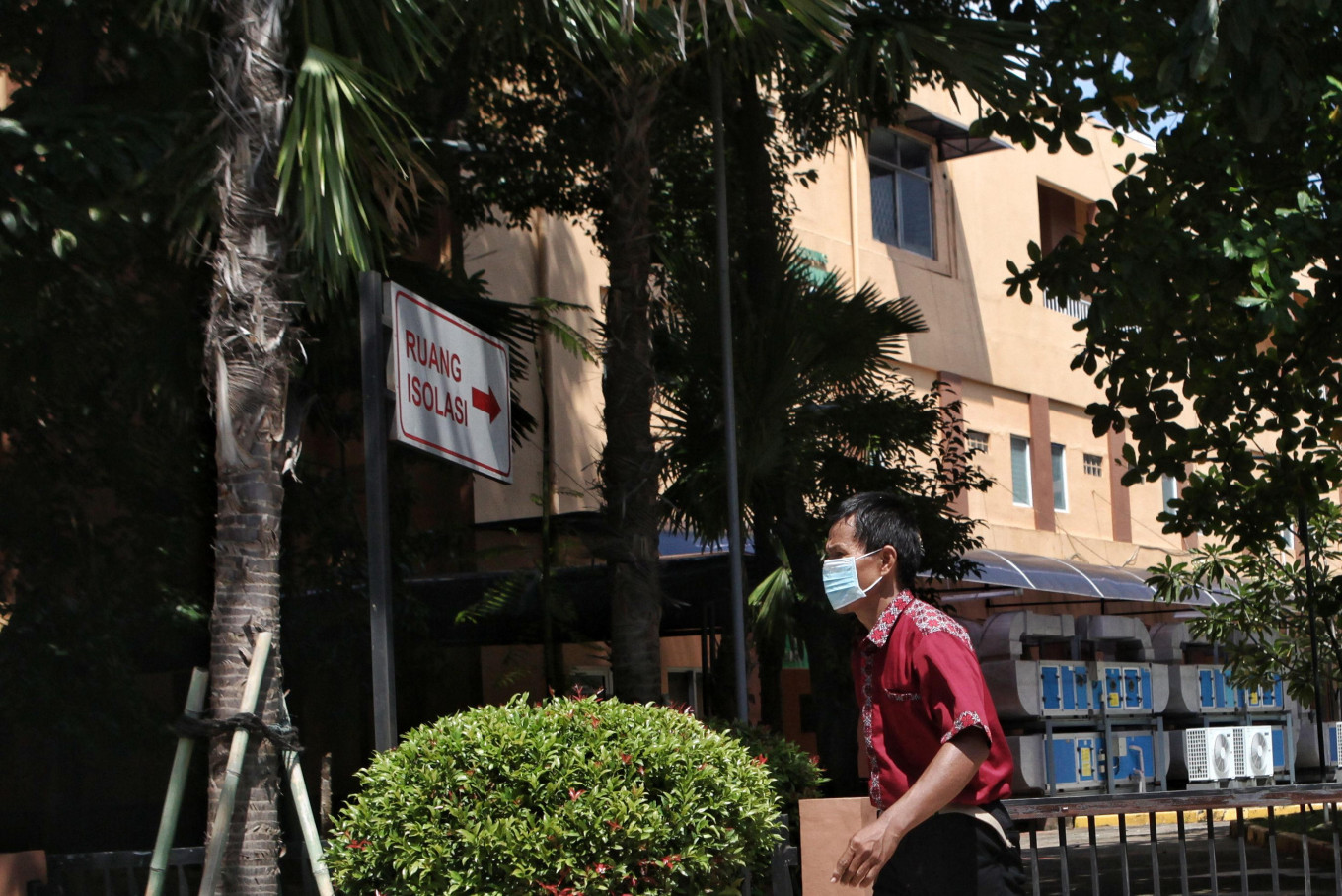Popular Reads
Top Results
Can't find what you're looking for?
View all search resultsPopular Reads
Top Results
Can't find what you're looking for?
View all search resultsPrivacy breach, fake news take mental toll on Indonesia's first COVID-19 cases
They tested positive for COVID-19. But they said what followed was worse than the disease.
Change text size
Gift Premium Articles
to Anyone
 A hospital staff member walks past Sulianti Saroso Infectious Diseases Hospital's isolation building in Jakarta on March 2.The health minister stated that two Indonesian citizens had tested positive for the novel coronavirus and were being treated at RSPI Sulianti Saroso. -JP/Seto Wardhana/Adi/20 (JP/Seto Wardhana)
A hospital staff member walks past Sulianti Saroso Infectious Diseases Hospital's isolation building in Jakarta on March 2.The health minister stated that two Indonesian citizens had tested positive for the novel coronavirus and were being treated at RSPI Sulianti Saroso. -JP/Seto Wardhana/Adi/20 (JP/Seto Wardhana)
I
ndonesia’s first two confirmed COVID-19 patients say media coverage and discourse on social media have taken a greater toll than the disease itself, saying that the numerous breaches of privacy have left them “mentally drained.”
President Joko "Jokowi" Widodo announced on Monday that a 31-year-old woman (Case 1) and her 64-year-old mother (Case 2), both residents of Depok, West Java had tested positive for the novel coronavirus after coming into contact with a Japanese woman who later tested positive in Malaysia.
Case 1 and Case 2 are currently receiving treatment in an isolation ward at Sulianti Saroso Infectious Diseases Hospital.
The President’s announcement came as a surprise not only to the public but to the patients themselves, Case 2 told kompas.com on Tuesday.
“We had not been [told that we had tested positive],” she said. “We only found out when [Jokowi announced it].”
Worse than the surprise announcement was what followed. Soon after the news broke, personal details of the two patients popped up on WhatsApp groups and social media, with unclear origins.
The details came in a viral message that started with the words "Spot Reports" and contained not only the patients' initials and ages but also their complete home address.
The message also detailed their symptoms and chronology of events, starting from when they had supposedly contracted the virus to when they were eventually admitted to their current hospital.
The Health Ministry has denied responsibility for the leak.
Besides the message, photographs of the patients also spread like wildfire. Some were even forwarded with the ironic caption “Please don’t share.”
Some people went as far as to question the patient's profession, correlating it with how she might have contracted the virus.
Health Minister Terawan Agus Putranto said on Monday that Case 1 was a dance teacher and had danced with the Japanese citizen, who he said was a close friend, in a club in Kemang, South Jakarta.
Reporters swarmed the patients' house, taking footage from just a few feet away from the doorstep, prompting the police to set up a police line to drive them away.
Read also: Activists, lawmakers criticize disclosure of personal information of COVID-19 patients
The situation caused Case 1 to write a lengthy WhatsApp message to explain herself, which has also gone viral.
In a further statement made on Wednesday, Case 1 shared her account on how she might have contracted the virus and what she did afterward--which differed from the one shared by authorities.
Case 1 said she had started coughing and having a fever on Feb. 16 and decided to visit a private hospital along with her mother last Thursday. There, she was diagnosed with bronchopneumonia and her mother with typhus.
The following day, her friend in Malaysia called her to let her know that a Japanese woman that had tested positive for the new virus on Feb. 26 had visited a restaurant in Jakarta where she had been hosting on Feb. 15.
Case 1 also said that she had attended a dance event at a restaurant in Menteng, Central Jakarta, on Feb. 15, not at a club in Kemang on Feb. 14.
"For the sake of national security and health, I informed the doctor that I needed to be tested [for the virus], and that's why I've been isolated since Sunday. I don't even know nor am I acquainted with the Japanese citizen," she said.
“And I want to emphasize, the Japanese citizen is a woman, not a man that ‘rented’ me like the gossip says,” she added. “I was just in a room with the Japanese woman without knowing who she was.”
Case 1 said she had given health authorities contacts of her family members and closest friends to be tested and to ensure that the virus would not spread further.
“Please respect me and my family’s privacy, stop spreading our photos and fake news about us,” she said.
Read also: COVID-19: Jokowi urges people to remain calm and respect patient privacy
The breach of the patients' personal data also affected their neighbors, who were also questioning how such detailed data of the patients could be disclosed to the public.
"Even us as their close neighbors don't know those details about them. I wondered whether the authorities were responsible," one of the patients' neighbors, Anis Hidayah of Migrant Care, told the Post.
She said people in the neighborhood regretted that media coverage had also disrupted their activities; some were not allowed to work by their employers, while app-based motorcycle taxi drivers were adamant about not accepting orders from the housing complex but even more so because it had framed people she knew personally in unfavorable ways.
"I hope this accelerates the issuance of a regulation on personal data protection," Anis said. (ars)
Editor's note: This story has been updated to clarify Case 1's statement about how she came into contact with the Japanese patient.









